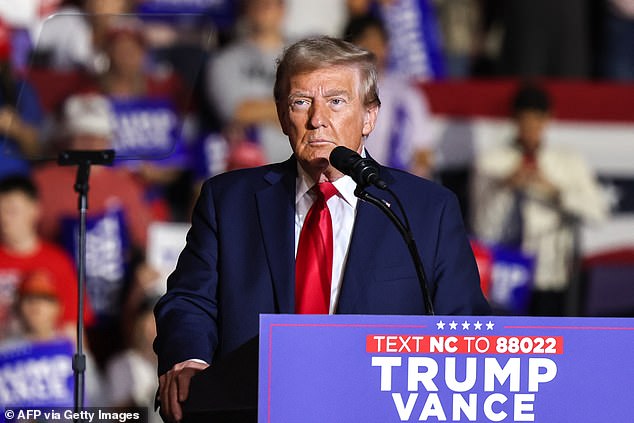The markets here are nervous – and understandably so – about Chancellor Rachel Reeves’s Budget on Wednesday.
Higher borrowing means higher interest rates, not just for the Government but for all of us.
Higher taxes will mean less money for people to spend, as falling consumer confidence shows. And companies have become less positive about growth than three months ago.
On a global level, one would naturally expect markets to be jittery about another event that is also just a few days away, namely the outcome of the US election.
That’s more important for us too, not just our American cousins.

Crunch time: Americans go to the polls soon – and their decision will also impact UK investors
So what should we think about that?
Well, the first thing to say is that the markets have been pretty calm. As far as equities are concerned, volatility has been low, with the S&P500 share index steady at close to its all-time high.
As to confidence in government debt, bond yields have climbed in recent weeks, with ten-year Treasury notes now yielding 4.2 per cent, but that is way below the nerviness of April, when they touched 4.7 per cent.
The dollar has strengthened somewhat, with the pound now back from $1.34 to $1.30 over the past month, but nothing dramatic.
The next thing to note is that the odds now favour a Donald Trump victory. The American crypto trading platform, Polymarket, was giving him a 64 per cent chance of beating Kamala Harris.
In the UK, Betfair Exchange reckons Trump is on the brink of ‘likely win’ – a 60 per cent chance. The odds have moved in recent weeks, as Harris was slightly ahead in September, so while no-one should take them too seriously – they failed to predict the Trump win in 2016 – there has been a clear shift in what big money reckons will happen.
My reading is that the markets think a Trump victory would on balance be good for share prices, and bad for bonds. But they are not too worried either way.
The present positive US investment climate is not as crazy as the mad euphoria that preceded the crash, but there are obvious fragilities
This is a very different perspective from that of political experts on both sides, who seem to think the outcome will be vital to the future of just about everything.
People just want to get on with their lives, or, as president Calvin Coolidge said in 1925: ‘After all, the chief business of the American people is business. They are profoundly concerned with producing, buying, selling, investing and prospering in the world.’
That was nearly 100 years ago, and a very long way from the earnest pronouncements of the pundits and think-tanks of today. But this ‘just get on with it’ sentiment better reflects what most ordinary Americans are feeling, as caught in the collective wisdom of the financial markets.
There are a number of ways of justifying record US share prices, but the key ones are that corporate profits are strong and the job market remains solid. As long as people can keep investing and prospering, that’s all right.
But moods shift. Calvin Coolidge’s comment came in the middle of the roaring twenties, which ended in the 1929 Wall Street crash and the Great Depression that followed.
The present positive US investment climate is not as crazy as the mad euphoria that preceded the crash, but there are obvious fragilities, notably the huge fiscal deficit and the danger of a resurgence of inflation. These are relevant to the UK.
We have not had the share market boom of the US. Our entire market is worth less than the technology firm Nvidia, which seems nuts. But if there were a sharp pull back in equity prices in the US it would be naive to think we would escape damage.
More directly, if inflation rises and US Treasury yields rise to, say, 5 per cent, it would be naïve to think the yield on gilts – UK Government bonds – would not climb in tandem. We have to live with the outcome of the US election whatever that turns out to be.
In the short term a Trump win might indeed be good for their economy; that is what the markets seem to think.
Longer term, it might well be the reverse. Our job as savers and investors is to make ourselves as bullet-proof as we can. This coming week will be the first test of that.
DIY INVESTING PLATFORMS

AJ Bell

AJ Bell
Easy investing and ready-made portfolios

Hargreaves Lansdown

Hargreaves Lansdown
Free fund dealing and investment ideas

interactive investor

interactive investor
Flat-fee investing from £4.99 per month

Saxo

Saxo
Get £200 back in trading fees
Trading 212
Trading 212
Free dealing and no account fee
Affiliate links: If you take out a product This is Money may earn a commission. These deals are chosen by our editorial team, as we think they are worth highlighting. This does not affect our editorial independence.
Some links in this article may be affiliate links. If you click on them we may earn a small commission. That helps us fund This Is Money, and keep it free to use. We do not write articles to promote products. We do not allow any commercial relationship to affect our editorial independence.
This article was originally published by a www.dailymail.co.uk . Read the Original article here. .


